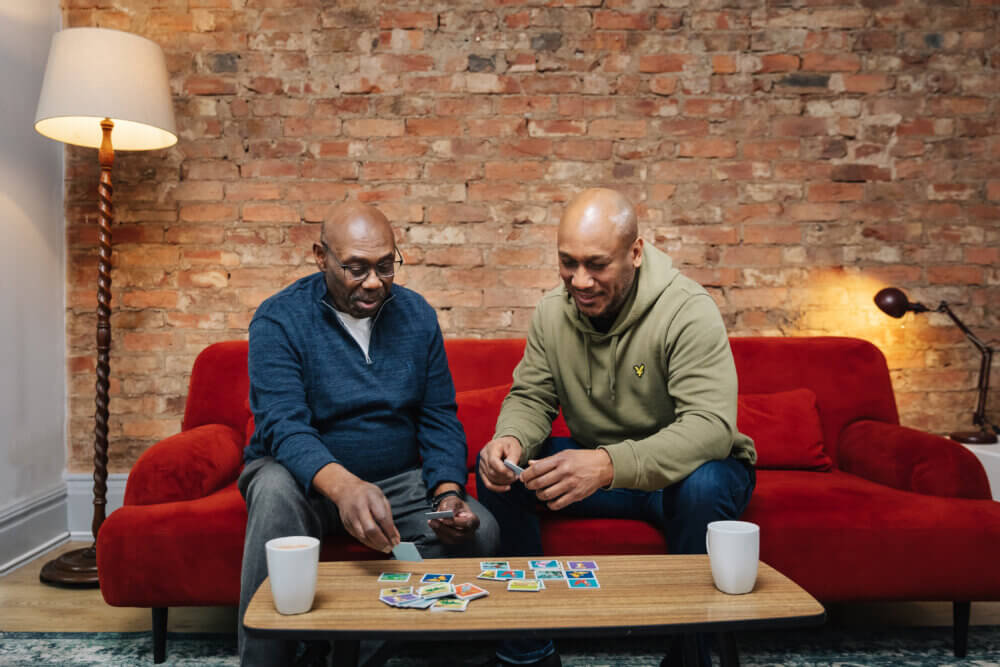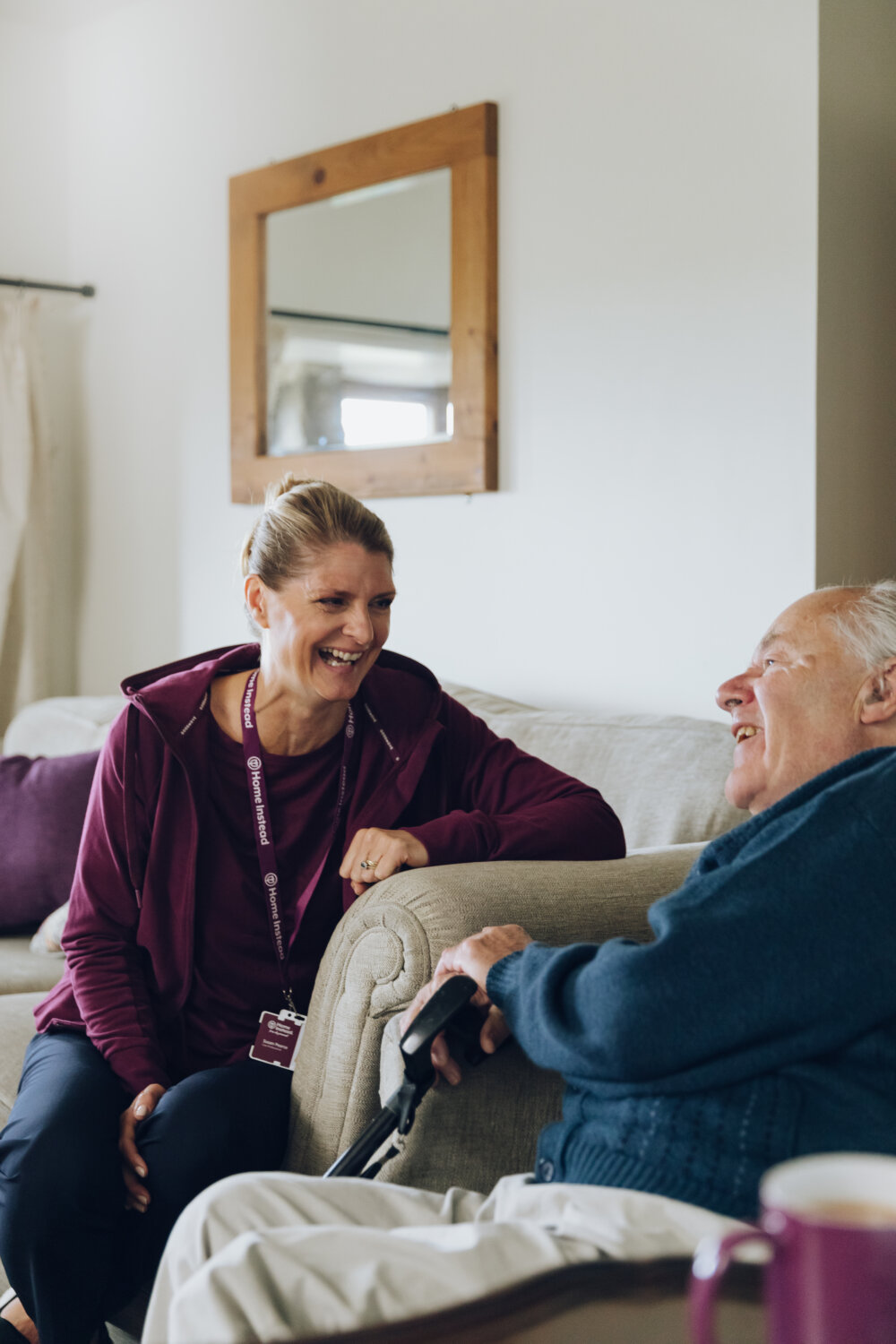What is dementia?
Learn what dementia is and how it can affect cognitive functioning over time.

What is dementia?
Dementia is an umbrella term for a range of progressive neurological disorders that impair cognitive function beyond what is expected of normal ageing. It can affect a person’s memory, reasoning, and the ability to perform daily activities, and can advance to the level where personality changes occur and daily tasks become harder. The most common types of dementia include Alzheimer’s disease, vascular dementia, dementia with Lewy bodies, frontotemporal dementia, and mixed dementia.While often associated with those over 65, early-onset dementia can affect younger people. In the UK, around 900,000 people currently live with dementia, a number projected to rise to 1.6 million by 2040, according to the Alzheimer’s SocietyIf you or a loved one has been diagnosed, you can learn more about symptoms, causes, diagnosis, and management through our resources, including our YouTube hub, Home Truths or guides like The Different Types of Dementia and Managing the Stages of Dementia.At Home Instead, we bring 20 years of experience in providing personalised, expert care to help people age comfortably at home, supported by industry-leading training for our Care Professionals. Whatever your dementia care questions, we’re here to help.

What are some of the signs and symptoms of dementia?
The symptoms of dementia vary depending on which parts of the brain are affected and the underlying cause. Regardless of specific symtpoms, dementia can be debilitating and distressing. Here are some common signs of dementia:Some common signs and symptoms of dementia include:
- Memory loss: A person with dementia might start to show signs of forgetfulness and lose their memory of recent events, names, where they live, and more. They may also start to misplace items around the house, become disoriented, get lost in familiar places or lose track of time easily.
- Communication issues: Dementia can affect communication and cause a person to struggle with finding the right words and expressing themselves effectively.
- Impaired decision making: Judgement and planning may be affected, making it more difficult to make effective decisions, assess risk, organise things and solve problems.
- Mood and personality changes: Dementia can cause changes in a person’s mood, typically before other symptoms appear. For example, increasing irritability or anger, or making them more anxious or depressed.
- Lack of interest: Those with dementia may start to lose interest in activities they once found enjoyable, such as hobbies or social gatherings.
- Struggles with daily tasks: Everyday tasks like getting washed and dressed or cooking dinner can become much more difficult for someone with dementia.
Symptoms of dementia often worsen over time, and many individuals will eventually need assistance with daily activities. If you’re concerned about rapidly advancing dementia, check out our article: What To Know About Rapid Onset Dementia
What causes dementia?
Different types of dementia are caused by different things, but in general dementia is thought to be caused by changes in certain regions of the brain which negatively impact neurons and their connections. It is unclear exactly why this happens to some people but not others. The most common type of dementia is Alzheimer’s disease, which is characterised by abnormal protein deposits in the brain. Lewy body dementia is another common type which involves these abnormal protein clumps, however Vascular dementia is thought to be caused by reduced blood flow to the brain, which can sometimes be the result of a stroke. Other causes of dementia include frontotemporal disorders, traumatic brain injuries, certain infections, and genetic factors. Age is still the primary risk factor, with dementia being most prevalent in those over 65 years old, but those who smoke, eat a poor diet and do not exercise could be more at risk of developing dementia down the line. Also, according to the World Health Organization women experience higher mortality due to dementia, and also provide around 70% of care hours for those living with dementia.

How is dementia diagnosed?
Diagnosing dementia is a process that requires discussion with the individual themselves and their family in order to fully understand the scope of symptoms and how far they have progressed. The National Institute for Health and Care Excellence says diagnosis of dementia typically involves steps such as:
- Undertaking an initial assessment to understand the person’s medical history by speaking to them and people who know them well, such as family or close friends.
- Assessing the person’s current level of cognition and function, compared to whatever is considered to be their base level. The aim is to determine whether or not there has been a significant decline in cognition since the onset of symptoms.
- Asking questions about the impact symptoms have on daily activities, such as eating, getting dressed, continence, taking medications, managing personal finances, and so on.
- Asking questions about safety in the home and elsewhere.
- Discussing any cognitive, behavioural or psychological changes.
- Looking at the risk factors for dementia, such as family history, alcohol or drug use, medication history, and more.
- Assessing for any coordination abnormalities, sensory issues, motor symptoms, visual or auditory problems, cardiovascular signs, or other causes of symptoms.
- Arranging relevant blood tests to rule out other possible causes of symptoms.
If you believe you or a loved one may have symptoms of dementia, the process of being diagnosed may seem frightening, but it is important to address symptoms as soon as possible in order to find out if dementia is the true cause, or if something else could be the problem. In any case, the earlier you seek medical help for symptoms of dementia, the more chance there is to potentially slow the progression of the disease and put help in place for you ahead of other symptoms developing.
How is dementia treated and managed?
There is no cure for dementia, so treatment is focused on managing the symptoms and ensuring those with the disease remain as healthy as possible for as long as possible, with the best quality of life possible. Dementia can be managed with:
- Medications: For some types of dementia, there are medications available that can help to alleviate symptoms and keep the brain working well for longer.
- Therapy: Certain therapies can help people with dementia maintain their functional abilities.
- Support: Support from family, close friends and caregivers is so important for those with dementia so they continue to feel safe and surrounded by people they trust when other things in life feel uncertain.
- Lifestyle modifications: Maintaining a healthy diet and getting regular exercise and movement has been shown in studies to help slow cognitive decline. Creating a structured routine can help those with dementia to feel more confident, and they should also be encouraged to continue taking part in hobbies and social gatherings if desired.
- Environmental modifications: Ensuring the home environment is safe and optimised for a person with dementia is important to help them continue their normal daily routine as much as possible and maintain independence for longer.
While treatment will not stop dementia from progressing, having a multidisciplinary Care Plan in place can help to ensure those living with dementia continue to feel safe and supported, and can maintain their independence. You may find our article on the dementia care plan useful: Building A Care Plan For A Dementia Patient At HomeCan anything be done to lower the risk of dementia? Lifestyle adaptations can help to lower the risk of developing dementia later in life, so if this is something you are worried about, you may wish to adopt some of the below healthy practices:
- Regular physical exercise or movement – This should be a mix of aerobic and strength-training if possible
- Maintain a healthy diet – Try to include lots of fruits, vegetables, and omega-3 fatty acids in your meals
- Take care of your heart – Cardiovascular risk factors like hypertension and diabetes can contribute to cognitive health too, so look after your heart to look after your brain
- Mental stimulation – Stay mentally stimulated with activities like reading, puzzles and social interactions
- Avoid excessive alcohol consumption – Evidence suggests that excessive alcohol consumption increases risk of dementia, so managing your alcohol intake is recommended
- Quit smoking – Smoking is associated with an increased risk of dementia, so quitting is the best way to reduce your likelihood of developing the disease later in life
- Getting enough sleep – Studies have suggested that not getting enough sleep can increase your risk of dementia later in life, so prioritising this is important
- Manage stress levels – Chronic stress has been associated with an increased risk of cognitive impairment and Alzheimer’s disease, so managing your stress levels is important
Being given a dementia diagnosis for yourself or a loved one can be an incredibly difficult and uncertain time, and you will likely have a lot of questions. While your doctor will be your first port of call for all things medical, you may also have concerns about where you will live, whether or not you will be able to continue living in your own home, or how you will cope with everyday tasks like getting ready in the morning and cooking meals – for these questions, remember you can reach out to your local council to arrange a Care Needs Assessment, but do also feel free to reach out to us at Home Instead. Our approach to dementia care is pioneering, and we have developed a unique programme for Care Professionals accredited by City & Guilds that is specialised for the home care environment, and created by dementia specialists and key medical practitioners from around the world. With our dementia care, you can rest assured you will receive the very best care to help you remain safe and calm at home, build your confidence, enjoy nutritious meals, engage in opportunities for social interaction and mind-stimulating activities, and much more. Whatever your fears about your dementia diagnosis, we can help to put your mind at ease and give you options for your next steps – feel free to reach out to the friendly Home Instead team any time. If you are looking after someone with dementia, you may find our article on this useful: Caring For Someone With Dementia At HomeHome Instead is an award-winning home care provider and part of a worldwide organisation devoted to providing the highest-quality relationship-led care for older people in their own homes. Arranging care for yourself or your loved one shouldn’t be stressful, so whatever questions you would like answered, feel free to reach out to the Home Instead team to discuss your needs.

Tim Howell , Learning and Development Partner
For the past 16 years, I have been dedicated to the care sector, progressing from Care Professional to Care Manager, and later assuming roles such as Specialist Training Manager. Currently, as a Learning and Development Partner at Home Instead’s National Office, I develop and review training programs, collaborate with external organizations like the Alzheimer’s Society, and manage various impactful projects.
My passion for dementia care has guided much of my work, from engaging with advanced dementia support initiatives, such as those offered by the End of Life Partnership, to staying informed through events like the annual Dementia Summit. These efforts reflect my deep commitment to enhancing the care and quality of life for individuals living with dementia